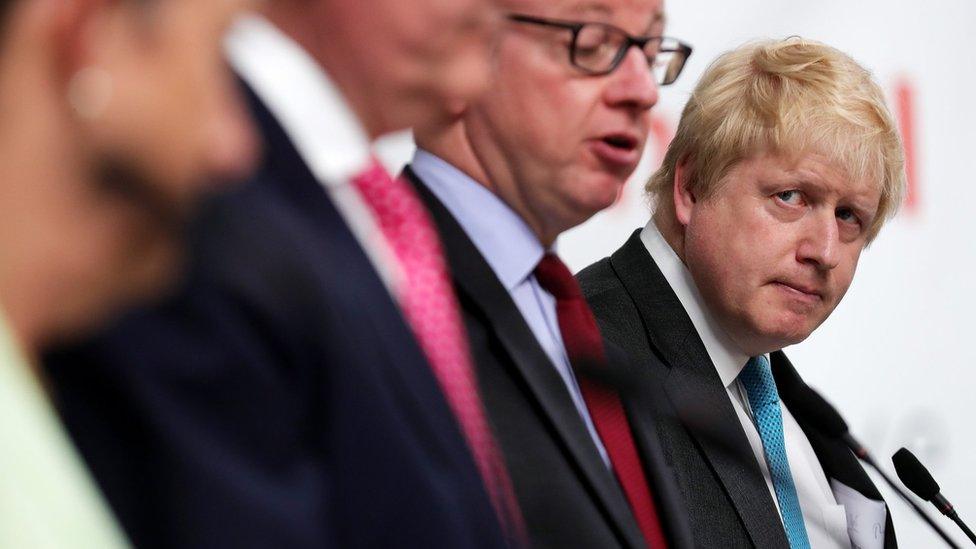Boris Johnson warns of EU migration 'risks'
- Published
- comments

Boris Johnson and Michael Gove said the "risky" option was remaining in the EU
Staying in the EU is the "riskier" option for the UK because it will be unable to control rising migration, Boris Johnson has warned.
The ex-London mayor said population growth was the biggest economic change in the UK for a century.
His fellow Leave campaigner Michael Gove said the EU was "undermining our population's security".
David Cameron accused the Leave campaign of trying to "peddle fantasy politics".
Remain campaigners also dismissed Mr Johnson's claim the UK would be unable to resist extra payment demands from Brussels as "nonsense" because EU leaders had already agreed the UK would not pay towards future bailouts.
The UK also had a veto over future budget increases, they added.
Vote Leave attempted to counter repeated warnings by the government about the consequences of leaving the EU at an event in Stratford-upon-Avon featuring Mr Johnson, Mr Gove and Labour MP Gisela Stuart where they set out what they said were "risks" of remaining.
Mr Johnson said the population growth was partly down to migration driven by the crisis in the eurozone and challenged the Remain side to spell out a plan for the pressure it was causing on housing and the NHS.
Labour MP and Remain campaigner Harriet Harman said these were the responsibility of the government, not the EU.
Mr Johnson also said his side was "winning all the democratic points" and that the Remain arguments were "morally and practically and completely wrong".



The benefits of the single market were "wildly overstated", Mr Johnson claimed, saying the UK could not be insulated from the cost of bailing out the failings of the eurozone and other hikes in costs.
Taking questions afterwards, he rejected the idea that David Cameron's renegotiation had secured protection for the UK from paying for future bailouts.
The deal "has no legal basis at the moment" and "could be quite easily overridden," he said.
Mr Gove, the justice secretary, said the EU's borderless Schengen Zone - which the UK is not part of - "actively abets terrorists".
He also said the policies of the single currency had led to the rise of extremist parties.

Analysis by Laura Kuenssberg, BBC political editor
For voters who are only just tuning into the EU referendum debate they might take one look and tune out again.
What they might see this morning - one side accusing the other of being a bunch of liars who you wouldn't trust to feed your cat, the other side claiming the others include bitter has-beens and a load of sneering patricians telling you they know best.
Political debate that, in some moments, isn't much more sophisticated than a bunch of school kids shouting "pants on fire" at each other in the playground.
Given this is one of the biggest choices we have made as a country for generations - I know that sounds trite but it is true - it's not exactly edifying to watch, and as happened during the wilder days of the Scottish referendum, this campaign is dabbling in a world where the truth is not a safe anchor.

Vote Leave says new figures suggest the UK could face a £2.4bn extra bill "soon after the referendum" because of a backlog of unpaid bills and a delay in the review of the EU's budget.
But it faced a rebuke from the Institute for Fiscal Studies, which responded after Mr Gove cited the think tank during a live Q&A on Sky News.
Speaking on Friday night, Mr Gove said: "There are billions of pounds that we send to the European Union every year and the IFS has pointed out that if we took that money back, we could spend it on the NHS, we could use it to reduce VAT on fuel."
The IFS issued a statement saying the UK's net contribution to the EU would be eclipsed by even a small damage to the public finances caused by leaving.
It added: "That is why we conclude that leaving the EU would not, as Michael Gove claims we said, leave more money to spend on the NHS. Rather it would leave us spending less on public services, or taxing more, or borrowing more."
At a separate event on Monday, which Britain Stronger in Europe called "an unprecedented display of cross-party support", Mr Cameron, Ms Harman, Lib Dem leader Tim Farron and Green Party leader Natalie Bennett said refusing to set out an economic plan for Brexit was "reckless and undemocratic".
They said: "It's time for the Leave campaign to outline their economic plan for Britain outside Europe.
"They are perpetuating an economic con-trick on the British people, and we're calling time on it. The British public deserve better than being asked to roll the dice."
They also unveiled a dossier on the "often contradictory statements" the Leave campaign has made on the economy, claiming it has had 23 positions on the alternative to the single market.
Vote Leave chief executive Matthew Elliott described the claims as "desperate stuff from an increasingly desperate campaign".
"We have set out a series of pledges about how life will be better if we take back control. We want to invest more in the NHS, create 300,000 jobs through new trade deals, cut energy bills for families and introduce a new Australian style points-based immigration system," he said.
Meanwhile, in a letter to the Guardian, external, union leaders - including the general secretaries of Unite, Unison and the GMB - backed the campaign to remain in the EU.
They warned the Conservative government would "negotiate away our rights" if voters backed Brexit.
Workers' rights - including maternity and paternity rights, equal treatment for workers and the right to paid leave - had been negotiated with European partners, they said.
"If Britain leaves the EU we are in no doubt these protections would be under great threat," the union added.